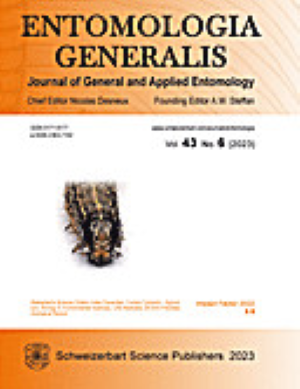The Argentine ant, Linepithema humile: natural history, ecology and impact of a successful invader
IF 4.6
1区 农林科学
Q1 ENTOMOLOGY
引用次数: 0
Abstract
The Argentine ant, Linepithema humile, is one of the world’s worst invasive species, with established populations in at least 40 countries on six continents. In this review, we synthesise the vast literature on this species in four areas, concentrating on its introduction to natural systems. The first section reviews its distribution, habitat preferences, and the factors promoting its invasion success. Second, we review current knowledge of its ecological impacts on invertebrates, vertebrates and ecosystem functions. The third section deals with behaviour and genetics, particularly traits promoting invasiveness. Finally, we address applied issues, emphasising the quantification of the economic costs and eradication strategies associated with L. humile invasion. Despite tremendous research efforts, especially over the past 40 years, numerous knowledge gaps remain in the understanding of the distribution, ecology, impacts, management, and economic costs of this species. We conclude by highlighting the most critical gaps and propose a research agenda to tackle the future challenges in the study of L. humile biology.阿根廷蚂蚁:成功入侵者的自然史、生态学和影响
阿根廷蚁(Linepithema humile)是世界上最严重的入侵物种之一,已在六大洲至少 40 个国家建立了种群。在这篇综述中,我们从四个方面对有关该物种的大量文献进行了归纳,重点介绍了它被引入自然系统的情况。第一部分回顾了它的分布、栖息地偏好以及促进其入侵成功的因素。其次,我们回顾了目前关于该物种对无脊椎动物、脊椎动物和生态系统功能的生态影响的知识。第三部分涉及行为和遗传学,特别是促进入侵的特征。最后,我们讨论了应用问题,强调了与红叶石楠入侵相关的经济成本量化和根除策略。尽管开展了大量研究工作,尤其是在过去 40 年中,但在了解该物种的分布、生态、影响、管理和经济成本方面仍存在许多知识空白。最后,我们强调了最关键的差距,并提出了一个研究议程,以应对未来研究 L. humile 生物学的挑战。
本文章由计算机程序翻译,如有差异,请以英文原文为准。
求助全文
约1分钟内获得全文
求助全文
来源期刊

Entomologia Generalis
生物-昆虫学
CiteScore
7.10
自引率
18.80%
发文量
72
审稿时长
>12 weeks
期刊介绍:
Its scope covers all aspects of basic and applied research dealing with insects and more broadly with arthropods inhabiting wild, agricultural and/or urban habitats. The journal also considers research integrating various disciplines and issues within the broad field of entomology and ecology.
Entomologia Generalis publishes high quality research articles on advances in knowledge on the ecology and biology of arthropods, as well as on their importance for key ecosystems services, e.g. as biological control and pollination. The journal devotes special attention to contributions providing significant advances (i) on the fundamental knowledge and on sustainable control strategies of arthropod pests (including of stored products) and vectors of diseases, (ii) on the biology and ecology of beneficial arthropods, (iii) on the spread and impact of invasive pests, and (iv) on potential side effects of pest management methods.
Entomologia Generalis welcomes review articles on significant developments in the field of entomology. These are usually invited by the editorial board, but proposals may be sent to the Editor-in-Chief for preliminary assessment by the editorial board before formal submission to the journal. The journal also considers comments on papers published in Entomologia Generalis, as well as short notes on topics that are of broader interest.
 求助内容:
求助内容: 应助结果提醒方式:
应助结果提醒方式:


